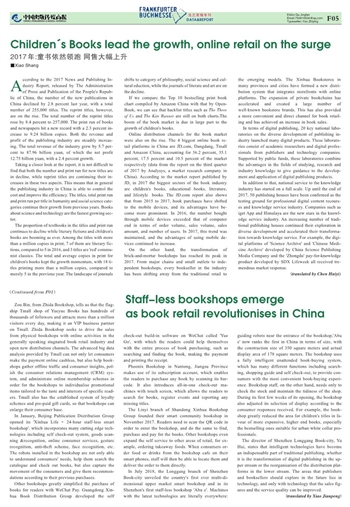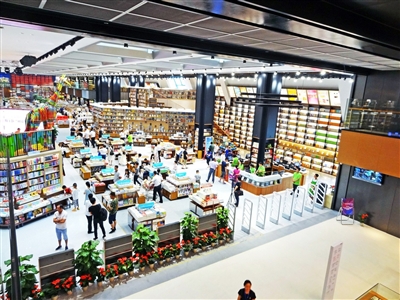New technologies have undoubtedly become an important factor in the transformation of book retail industry in China and the key objective of this transformation is to provide more user-friendly and convenient services and more diverse reader experiences to the consumer. In order to provide better services to both online and offline consumers, many bookshops in China cooperate with online platforms such as Tmall, and even make use of robots and face recognition technologies to revolutionise the landscape of physical bookselling—staff-less bookshops.
China's first staff-less bookshop, Zhida Bookshop, opened on 23rd April in Shanghai with the cooporation with Tmall, an online retail giant of the country. The bookshop and Tmall look forward to bringing the smart bookshop that can offer seamless online and offline shopping experience to readers into the reality, like Amazon Go does in Seattle. In its 94 square meters of indoor area, Zhida Bookshop has a stock of over 3,000 titles of literary fictions and popular social science books.
Zhida Bookshop belongs to the parent company of Shanghai Yueyue Books Co. Ltd. Its location near Fudan University and the high school attached to it gives the bookshop a solid consumer base of well-educated young readers. As a complement to the physical bookshop, the official Tmall shop of Yueyue Books makes the browsing of more diverse titles convenient for online consumers. It also facilitates the analysis of online book sales in order to guide the offline promotion and book-related events, therefore combining organically the consumer loyalty in online and offline environments between the brand of Yueyue books and readers.
(Continued on F05) (Continued from F01)
Zou Bin, from Zhida Bookshop, tells us that the flagship Tmall shop of Yueyue Books has hundreds of thousands of followers and attracts more than a million visitors every day, making it an VIP business partner on Tmall. Zhida Bookshop seeks to drive the sales from physical bookshops with online activities in the generally speaking stagnated book retail industry and open new distribution channels. The advanced big data analysis provided by Tmall can not only let consumers make the payment online cashless, but also help bookshops gather offline traffic and consumer insights, polish the consumer relations management (CRM) system, and administrate online membership schemes in order for the bookshops to individualise promotional items tailored to the taste and interests of specific readers. Tmall also has the established system of loyalty schemes and pre-paid gift cards, so that bookshops can enlarge their consumer base.
In January, Beijing Publication Distribution Group opened its 'Xinhua Life + 24-hour staff-less smart bookshop', which incorporates many cutting edge technologies including self check-out system, goods scanning &recognition, online consumer services, gesture recognition, anti-theft scheme, face recognition, etc. The robots installed in the bookshop are not only able to understand consumers' needs, help them search the catalogue and check out books, but also capture the movement of the consumers and give them recommendations according to their previous purchases.
Other bookshops greatly simplified the purchase of books for readers with WeChat Pay. Guangdong Xinhua Book Distribution Group developed the self check-out build-in software on WeChat called 'Yue Go', with which the readers could help themselves with the entire process of book purchasing, such as searching and finding the book, making the payment and printing the receipt.
Phoenix Bookshop in Nantong, Jiangsu Province makes use of its subscription account, which enables the readers to purchase any book by scanning its barcode. It also introduces all-in-one check-out machines with touch screen, which allows the readers to search for books, register events and reporting any missing titles.
The Linyi branch of Shandong Xinhua Bookshop Group founded their smart community bookshop in November 2017. Readers need to scan the QR code in order to enter the bookshop, and do the same to find, purchase and pay for the books. Other bookshops even expand the self service to other areas of retail, for example, ordering takeaway foods. When consumers order food or drinks from the bookshop cafe on their smart phones, staff will then be able to locate them and deliver the order to them directly.
In July 2018, the Longgang branch of Shenzhen Book-city unveiled the country's first ever multi-dimensional upper market smart bookshop and in its Shenzhen's first staff-less bookshop 'Abu e'. Machines with the latest technologies are literally everywhere: guiding robots near the entrance of the bookshop,'Abu e' now ranks the first in China in terms of size, with the construction size of 350 square meters and actual display area of 178 square meters. The bookshop uses a fully intelligent unattended book-buying system, which has many different functions including searching, shopping guide and self check-out, to provide consumers with the most convenient book-buying experience. Bookshop staff, on the other hand, needs only to check the stock and maintain the tidiness of the shop. During its first few weeks of its opening, the bookshop also adjusted its selection of display according to the consumer responses received. For example, the bookshop greatly reduced the area for children's titles in favour of more expensive, higher end books, especially the bestselling ones suitable for urban white collar professionals.
The director of Shenzhen Longgang Book-city, Yu Hui, states that intelligent technologies have become an indispensable part of traditional publishing, whether it is the transformation of digital publishing in the upper stream or the reorganisation of the distribution platforms in the lower stream. The areas that publishers and booksellers should explore in the future lies in technology, and only with technology that the sales figures and the service quality can be improved.
(translated by Xiao Jianpeng)




